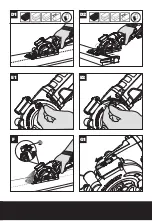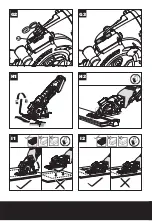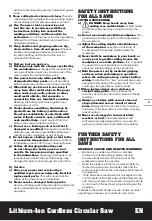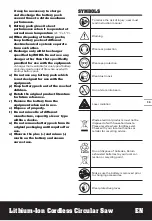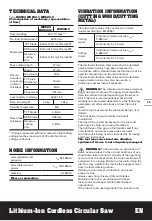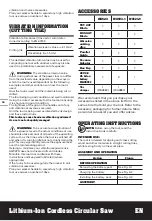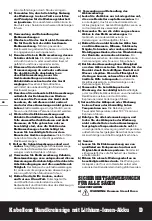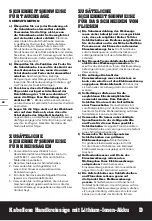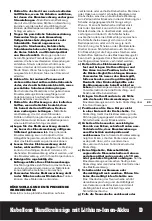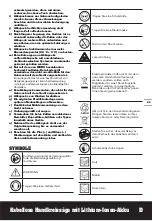
Lithium-Ion Cordless Circular Saw EN
10
avoided by taking proper precautions as given below.
a) Maintain a firm grip on the saw and position
your arms to resist kickback forces.
Position your body to either side of the
blade, but not in line with the blade.
Kickback
could cause the saw to jump backwards, but
kickback forces can be controlled by the operator,
if proper precautions are taken.
b) When blade is binding, or when interrupting
a cut for any reason, release the trigger and
hold the saw motionless in the material until
the blade comes to a complete stop. Never
attempt to remove the saw from the work
or pull the saw backward while the blade is
in motion or kickback may occur.
Investigate
and take corrective actions to eliminate the cause
of blade binding.
c) When restarting a saw in the workpiece,
centre the saw blade in the kerf so that the
saw teeth are not engaged into the material.
If a saw blade binds, it may walk up or kickback
from the workpiece as the saw is restarted.
d) Support large panels to minimise the risk
of blade pinching and kickback.
Large panels
tend to sag under their own weight. Supports
must be placed under the panel on both sides,
near the line of cut and near the edge of the
panel.
e) Do not use dull or damaged blades.
Unsharpened or improperly set blades produce
narrow kerf causing excessive friction, blade
binding and kickback.
f) Blade depth and bevel adjusting locking
levers must be tight and secure before
making the cut.
If blade adjustment shifts while
cutting, it may cause binding and kickback.
g) Use extra caution when sawing into
existing walls or other blind areas.
The
protruding blade may cut objects that can cause
kickback.
SAFETY INSTRUCTIONS
FOR PLUNGE TYPE SAWS
GUARD FUNCTION
a) Check the guard for proper closing before
each use. Do not operate the saw if the
guard does not move freely and enclose
the blade instantly. Never clamp or tie the
guard so that the blade is exposed.
If the saw
is accidentally dropped, the guard may be bent.
Check to make sure that the guard moves freely
and does not touch the blade or any other part, in
all angles and depths of cut.
b) Check the operation and condition of the
guard return spring. If the guard and the
spring are not operating properly, they
must be serviced before use.
The guard may
operate sluggishly due to damaged parts, gummy
deposits, or a build-up of debris.
c) Assure that the base plate of the saw will
not shift while performing a “plunge cut”.
Blade shifting sideways will cause binding and
likely kick back.
d) Always observe that the guard is covering
the blade before placing the saw down on
bench or floor.
An unprotected, coasting blade
will cause the saw to walk backwards, cutting
whatever is in its path. Be aware of the time it
takes for the blade to stop after the switch is
released.
ADDITIONAL SAFETY
RULES FOR YOUR
CIRCULAR SAW
1. Use only saw blades recommended by the
manufacturer, which conform to EN 847-1, if
intended for wood and analogous materials.
2. Do not use any abrasive wheels.
3. Use only blade diameter(s) in accordance with the
markings.
4. Identify the correct saw blade to be used for the
material to be cut.
5. Use only saw blades that are marked with a
speed equal or higher than the speed marked on
the tool.
CUT-OFF MACHINE SAFETY
WARNING
a) The guard provided with the tool must be
securely attached to the power tool and
positioned for maximum safety, so the least
amount of wheel is exposed towards the
operator. Position yourself and bystanders
away from the plane of the rotating wheel.
The guard helps to protect operator from broken
wheel fragments and accidental contact with
wheel.
b) Use only bonded reinforced or diamond cut-
off wheels for your power tool.
Just because
an accessory can be attached to your power tool,
it does not assure safe operation.
c) The rated speed of the accessory must
be at least equal to the maximum speed
marked on the power tool.
Accessories
running faster than their rated speed can break
and fly apart.
d) Wheels must be used only for recommended
applications. For example: do not grind with
the side of cut-off wheel.
Abrasive cut-off
wheels are intended for peripheral grinding, side
forces applied to these wheels may cause them to
shatter.
e) Always use undamaged wheel flanges that
are of correct diameter for your selected
Summary of Contents for WorxSaw WX523.9
Page 3: ...7 9 8 10 13 1 2 3 4 5 6 11 12 14 15 ...
Page 4: ...B C1 3 2 2 1 A2 A3 A1 1 A2 17 16 18 19 2 1 2 1 C2 ...
Page 5: ...D2 E2 F G1 E1 20 D1 ...
Page 6: ...H2 G3 I1 I2 H1 G2 21 ...
Page 7: ...J ...
Page 174: ......
Page 175: ......
Page 176: ...Copyright 2020 Positec All Rights Reserved AR01231608 www worx com ...





